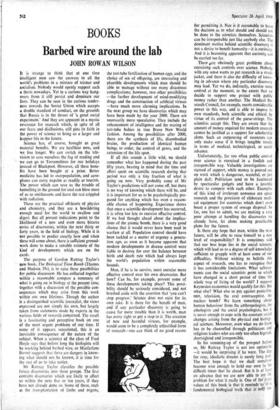Barbed wire around the lab .
BOOKS
JOHN ROWAN WILSON
It is strange to think that at one time intelligent men saw the answers to all the world's problems in a mixture of science and socialism. Nobody would openly support such a thesis nowadays. Yet in a curious way hang- overs from it still persist and dominate our lives. They can be seen in the curious tender- ness towards the Soviet Union which accepts a double standard of conduct, on the grounds that Russia is in the throes of 'a great social experiment.' And they are apparent in a mystic reverence for research which, in spite of all our fears and disillusions, still pins its faith in the power of science to bring us a larger and happier life in the future.
Science has, of course, brought us great material benefits. We are healthier now, and we live longer. We can switch on the tele- vision to save ourselves the fag of reading and we can go to Torremolinos for our holidays instead of Blackpool. However, all these bene- fits have been bought at a price. Better medicine has led to overpopulation, and aero- planes can carry napalm as readily as tourists. The power which can save us the trouble of tunnelling in the ground for coal can blow most of us to smithereens and leave the rest crippled with radiation.
These are the practical offshoots of physics and chemistry, and they are a bewildering enough meal for the world to swallow and digest. But all present indications point to the likelihood of a new and even more bizarre series of discoveries, within the next thirty or forty years, in the field of biology. While it is not possible to predict exactly how and when these will come about, there is sufficient ground- work done to make a sensible estimate of the kind of developments which are on the cards.
The purpose of Gordon Rattray Taylor's new book, The Biological Time Bomb (Thames and Hudson 35s), is to raise these possibilities for public discussion. He has collected together within a reasonable compass a summary of what is going on in biology at the present time, together with a discussion of the possible con- sequences which may arise from this work within our own lifetimes. Though the author is a distinguished scientific journalist, the views expressed are not simply his own, but largely taken from statements made by experts in the various fields of research concerned. The result is a fascinating and perceptive book on one of the most urgent problems of our time. If some of it appears sensational, this is an inevitable consequence of the nature of the subject. When a scientist of the class of Fred Hoyle says that before long the biologists will be working behind barbed wire, or Macfarlane Burnet suggests that there are dangers in know- ing what should not • be known, it is time for the rest of us to take notice.
Mr Rattray Taylor classifies the possible future discoveries into three groups. The first contains discoveries which are likely to affect us within the next five or ten years, if they have not already done so. Some of these, such Is the transplantation of limbs and organs, the test-tube fertilisation of human eggs, and the choice of sex of offspring, are interesting and plausible developments which man should be able to manage without too many disastrous complications; however, two other possibilities —the further development of mind-modifying drugs and the construction of artificial viruses —have much more alarming implications. In the next group we have discoveries which may have been made by the year 2000. These are necessarily more speculative. They include the enhancement of intelligence and the rearing of test-tube babies in true Brave New World fashion. Among the possibilities after 2000, there are the synthesis of life, disembodied brains, the production of identical human beings to order, the control of genes, and the extension of the life span.
If all this sounds a little wild, we should remember what has happened during the past fifty years, bearing in mind that the time and effort spent on scientific research during that period was only a tiny fraction of what is going on now. Very probably some of Mr Taylor's predictions will not come off, but there is no way of knowing which these will be, and it is important for us to be psychologically pre- pared for anything which has even a reason- able chance of happening. Experience shows that once a scientific development has occurred, it is often too late to exercise effective control. If we had thought ahead about the implica- tions of the atomic bomb, there is a very good chance that it would never have been used in warfare at all. Population control should have been tackled as a matter of urgency a genera- tion ago, as soon as it became apparent that modern developments in disease control were liable to destroy for ever the balance between birth and death rate which had always kept the world's population within reasonable bounds.
Man, if he is to survive, must exercise more effective control over his own discoveries. But how? Can he, for example, prevent some of these developments taking place? This possi- bility should be seriously considered, and not brushed aside with the assertion that 'you can't stop progress.' Science does not exist for its own sake. It is there for the benefit of man, and if any particular discovery is going to cause far more trouble than it is worth, man has every right to put a stop to it. The creation of new and harmful viruses, for example, would seem to be a completely wijustified form of research—one can think of no good reason for permitting it. Nor is it reasonable to leave the decision as to what should and should not be done to the scientists themselves. Scientists can be irresponsible just like anybody else. The dominant motive behind scientific discovery is not a desire to benefit humanity—it is curiosity. And it is becoming apparent that curiosity can be carried too far.
There ire obviously great problems about exercising such controls over science. Nobody with any sense wants to put research in a strait- jacket, and there is also the difficulty of know- ing in advance where any particular discovery may lead. Yet we do, indirectly, exercise some control at the moment, to the extent That we decide to support one project with public money rather than another. The Medical Re- search Council, for example, exerts considerable power in this way, and is able to impose its own standards, both scientific and ethical, by virtue of its control of the purse-strings. The scientists accept this. They are aware that the amount of money required for modern research cannot be justified as a support for scholarship alone. Such an outpouring of resources can only make sense if it brings tangible results in terms of medical, technological, or social advance.
Unfortunately, far too often public control over science is exercised in a foolish and irresponsible way. Valuable investigations are starved of support, while money is poured out on work which is dangerous, wasteful, or just plain daft. Politicians tend to be fascinated by spectacular gadgets and have a juvenile desire to compete with each other. Examples of this kind of irrelevant nonsense are space research and the provision of elaborate medi- cal equipment for countries which don't even boast a proper system of sewage disposal. So far, one has to admit, we are making a very poor attempt at handling the discoveries we already have, let alone making practicable plans for the future.
Is there any hope that man, within the near future, will be able to raise himself to a new level of responsibility? It is sometimes said that our best hope lies in the social sciences, which will lead us to a degree of self-knowledge sufficient to grapple with at least some of our difficulties. Without wishing to belittle this aspect of research, one has to recognise that it has considerable limitations. What achieve- ments can the social scientists point to which have changed in a short period of time the whole way of living of the world? I suppose Keynesian economics would qualify for this. But what else? What else to put against penicillin, DDT, television, the oral contraceptive, the nuclear bomb? We learn something about human behaviour from the anthropologists, the ethologists and the social psychologists, but it is never enough to cope with the constant social changes arising from the physical and biologi- cal sciences. Moreover, even what we do learn has to be channelled through politicians and religious leaders who are only too often bigoted, shortsighted and irresponsible. In his summing-up of the prospect before us, Mr Rattray Taylor is not too opthnistic —it would be surprising if he were. The day for rosy, idealistic dreams is surely long past. The best hope is that we shall somehow become wise enough to hold our own in the difficult times that lie ahead. But it is at least an advance that we are now able to set the problem for what it really is One of the' values of this book is that it reminds- ueof a fundamental biological truth that is 'oaf too
often forgotten. The prime task of man is not the achievement of perfection. It is not to develop a theoretically ideal social system, or make men like gods, or to keep the world safe for democracy. It is survival.







































 Previous page
Previous page